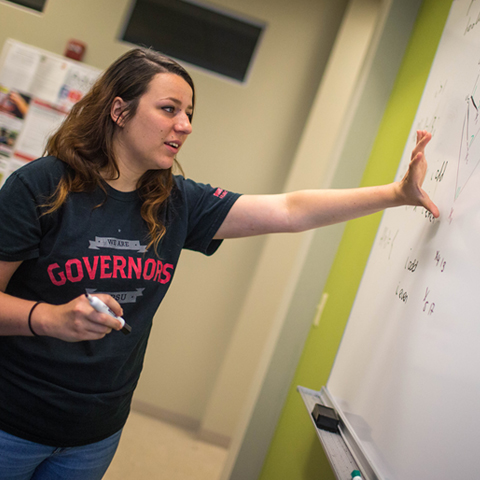Why Study Actuarial Science
The Actuarial Science concentration is a good fit for students who like to apply mathematics to solve real-world problems in business, insurance, finance, and government settings. An actuary:
- Analyzes the financial consequences of risk.
- Uses technology to evaluate historical data and calculate probabilities that serve as the foundation of forecasts about uncertain future events.
- Creates sophisticated mathematical models using machine learning and predictive analytics techniques.
- Advises top management in making strategic business decisions.
- Manages a company’s funding levels using theories of financial mathematics.
Actuaries work in some of the world’s largest corporations such as Cigna, Blue Cross Blue Shield, Aetna/CVS, State Farm, Humana, UnitedHealth, Milliman, AIG, Liberty Mutual, Willis Towers Watson, Prudential, U.S. Department of Defense, Tennessee Department of Treasury (TCRS), and banks and financial companies.
The APSU Actuarial Science concentration is recognized by SOA as a UCAP-AC program (Universities and Colleges with Actuarial Programs: Advanced Curriculum). Our program is one of only two programs in Tennessee to receive this highly sought recognition. A few Tennessee colleges and universities cover the first two preliminary actuarial exams, but APSU covers at least 5 actuarial exams.
Exam coverage in our curriculum:
Exam P/1: MATH/STAT 4240 Probability
Exam FM/2: MATH 4130 Financial Mathematics
Exam FAM: MATH 4190 Fundamentals of Actuarial Mathematics
Exam ASTAM : MATH 4180 Advanced Short-Term Actuarial Mathematics
Exam ALTAM: MATH 4280 Advanced Long-Term Actuarial Mathematics
Our program is known for its small class sizes and the one-on-one attention professors are able to give students. Our professors work closely with students to achieve their goals, secure scholarships, pass exams, obtain internships, and interview for jobs at graduation. Professors have developed many industry relationships and contacts that benefit students looking for internships or employment. APSU provides exam preparation materials in the library, and often have funds to reimburse exam fees for full-time students passing exams. All students complete a capstone project in their senior year with a faculty mentor. Additionally, faculty may offer students opportunities to work with them on research projects and attend actuarial science conferences.
Actuaries are highly sought-after professionals who develop and communicate solutions for complex financial issues. Specifically, actuaries measure and manage risk. Actuaries have a deep understanding of mathematics, statistics, financial theory, and business management. With this, they help businesses grow and provide value to their customers. Actuaries help leaders make strategic decisions and consumers prepare for their future (Society of Actuaries). According to the U.S. Bureau of Labor Statistics, the median annual salary for actuaries was $105,900 in May 2021. More information about actuarial science careers can be found at Be An Actuary.
The concentration in actuarial science prepares students for entry-level positions in actuarial science, as well as other areas. Prior to graduation, students typically pass at least two actuarial exams and complete the validation by educational experience (VEE) credits for either of the two actuarial societies – Society of Actuaries (SOA) or Casualty Actuary Society (CAS). The concentration also prepares students for entry into Master's and Ph.D. programs in actuarial science, mathematics, mathematical finance, economics, statistics, and other related disciplines.
An actuary must be well-versed in mathematics, statistics, finance, and data analysis. The faculty in the Actuarial Science concentration have experience teaching mathematics, statistics, machine learning, predictive analytics, financial mathematics, and data science courses at the undergraduate and graduate levels. All full-time professors have completed terminal degrees in various mathematics, statistics, and mathematical finance fields. Most faculty members have years of real-world experience in different mathematical/statistics disciplines and have earned a variety of actuarial credentials. Actuarial Science faculty are also engaged in multi-disciplinary research and are active in local, state, and national professional actuarial science organizations.
What will I learn
- Use and apply standard techniques in probability and statistics to various problem in Actuarial Science.
- Define basic terms in insurance, financial mathematics and financial derivatives.
- Calculate various quantities in financial mathematics and financial derivatives such as interest, premium, bond prices, annuities, amortization, put/call prices, and payoff and risk.
- Use and apply mathematical models behind financial derivatives.
- Apply technology to solve actuarial problems.
- Communicate meaning behind actuarial models or provide mathematical answers effectively and clearly to a general audience.
- Use and apply predictive analytics techniques to inform decision-making.
Program Information
Actuarial Science Program Requirements
